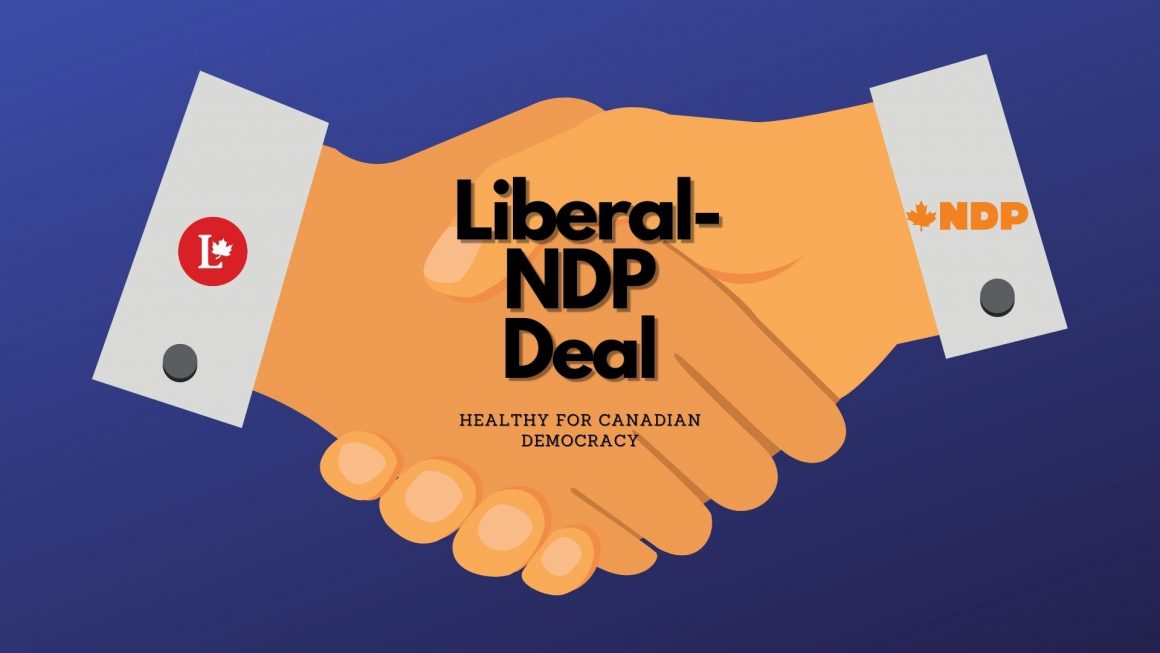
The Liberal-NDP deal is healthy for Canadian democracy
By Logan Jaspers, April 6 2022—
On Feb. 10, Conservative MP and leadership candidate Scott Aitchison wrote an op-ed for the Huntsville Doppler, where he said “as our country grows further polarized, I worry that more and more Canadians feel as if they are unable to voice their perspectives.” He also said in a speech in the House of Commons that Trudeau should “be willing to compromise.”
Naturally, after the CBC’s Vassy Kapelos broke the news that the leadership of the federal Liberal Party and NDP agreed to a confidence-and-supply agreement until 2025, Canada’s political right reacted swiftly — and venomously. The Conservative Party put out a statement condemning the deal in an assortment of ways, calling it a “callous attempt by Trudeau to hold on to power” and indicative of how Trudeau is losing the confidence of Canadians.
Of course, not everyone likes this deal, especially the official opposition — and why should they? Everyone has their views and those views may conflict with the stated legislative priorities of the Liberals and NDP. Even supporters of the deal should want all proposed legislation to be scrutinized. What is bizarre is the condemnation of the deal as anti-democratic when this is the House of Commons functioning as it should — the Liberal government is reaching out to another party and negotiating a way for parliament to work effectively when no party has a majority.
The nature of the arrangement is being distorted by the Conservatives. The aforementioned press release refers to the deal as an “NDP-Liberal Coalition.” In reality, this is a confidence-and-supply deal, which keeps the NDP out of the cabinet but they will vote in favour of the government during confidence votes. In exchange, the Liberals will craft legislation tailored towards NDP priorities.
Supply-and-confidence deals are not without provincial precedent. Currently, the Liberals and NDP in the Yukon Territory have a similar arrangement. British Columbia’s NDP was propped up by the provincial Greens from 2017 to 2020. And decades of Progressive Conservative governments in Ontario were ended by a Liberal-NDP accord in 1985 — an accord that led to some of Ontario’s most progressive legislation. While this is the first time a federal confidence-and-supply deal has occurred in Canada, the Liberals and the NDP have a storied history of informal cooperation going back to the minority governments of Lester B. Pearson, which passed national medicare with the support of the NDP.
If you care about Canadian democracy, this deal should be welcome. There are fundamental principles that parties should not compromise on but when it comes to the day-by-day operation of government, there is no reason for parties within the House of Commons to not cooperate. The centralization of power into majority governments — majority governments won largely with minority support — is contrary to the nature of representative democracy. The prime minister shouldn’t get a free ride through parliament to pass whatever legislation they want. Instead, they should have to work out deals like confidence-and-supply agreements or coalition governments, where parties that represent greater swathes of Canadians get input as well.
For those concerned with a potential tyranny of the majority, if the NDP are unhappy or if the Liberals desire a new mandate, they can withdraw from the agreement. There is nothing but the potential reprisal at the ballot box that binds them. A party withdrawing from the deal would cause a snap election, like in British Columbia in 2020 and Ontario in 1987, where popular minority governments took advantage of their polling to call a snap election despite their confidence-and-supply deals.
Fresh federal elections are undesirable but this parliamentary instability is a consequence of distortionary first-past-the-post elections. A fix for this would be proportional representation, which would dilute parliamentary power by giving parties a proportionate number of seats while disincentivizing snap elections by removing the distortionary effects of first-past-the-post. Parties would have no choice but to work together to govern Canada effectively.
Overall, I agree with Scott Aitchison. The government, regardless of which party is in power, should reach out, listen and compromise. More Canadians should have their voice heard in government. As such, despite Conservative hyperbole, there is nothing unusual about the Liberal-NDP supply-and-confidence deal. It’s fair to disagree with the policies supported by the Liberals and NDP but opposing parliamentary cooperation is a road to nowhere. Though there is work to be done to make parliament more representative, this is a healthy step towards the ideal of representative democracy.
This article is part of our Opinions section.
